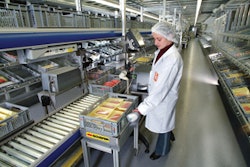Bonn, Germany — July 17, 2007 — Despite growing awareness of the need to safeguard ecological resources, few companies are putting this principle into practice in their buying behaviors, according to a recent study by consulting firm BrainNet.
Given global climate change and the pollution of the environment, most companies are no longer asking whether they want to do something to protect the planet, but rather are considering what they can do.
Procurement policies could have a significant impact on a company's environmental "footprint," given that somewhere between 50 and 70 percent of a company's overall costs originate from purchasing.
However, "green purchasing" so far has had no standard definition. Generally speaking, it is understood to mean the purchase of products and services with minimal negative effects on the environment. This relates to the entire lifecycle of the products, from manufacturing and transport to processing, disposal and recycling.
"More than half of all processes between companies and their commercial, ecological and economic environment are purchasing-related," says Sven T. Marlinghaus, partner at BrainNet. "Greater focus must therefore be placed on the environment when it comes to purchasing."
New Criteria in Purchasing Decisions
Purchasing decisions have typically been made based on such criteria as product, quality, coordination or risk costs. A purchase that complies with the principles of green procurement also takes greater account of the costs for environmental damage arising from production, delivery and processing.
So far only a few companies and official organizations in Germany are taking such "green" factors into consideration in their purchasing, according to the BrainNet study. "Fewer than 20 percent of all companies are actively tackling green procurement, and not even one in 10 companies is taking account of environmental costs as a critical factor when making decisions about its expenditure," notes Marlinghaus. "In the context of a globally oriented procurement organization in particular, this issue is an especially thorny one."
Studies at both national and international levels have confirmed these trends, BrainNet says. For example, the German Institute for Economic Research estimates the costs of climate change in Germany alone over the next 50 years at 800 billion euros ($1.1 billion). Elsewhere, the United Nations climate report may avoid specific figures, but it comes to the conclusion that there is an ongoing climate change and that it is caused by mankind. Based on these findings, the U.N. report suggests a price for CO2.
The creation of global emissions trading is also one of the key pledges of the Stern Report carried out on behalf of the British government. The team led by Nicholas Stern, the World Bank's former chief economist, states that the reason for its call for action is that if climate protection is abandoned, costs will be 20times those of the effective reduction of greenhouse gases.
"Eco-friendly processes and an intact ecological system will in the foreseeable future become crucial location and investment factors," says Josef Schwake, senior vice president for corporate sourcing coordination at Bertelsmann. "The price of a commodity or service is increasingly being influenced by ecological factors. Modern purchasing organizations have to take this into account professionally."
Green Procurement as Value Driver
This forecast is already being confirmed today. The responses by markets, customers, public bodies and other commercial players to the adherence to, or infringement of, environmental standards have become significantly stronger in recent years. "Over 10 years ago, the tremendous public dynamism surrounding the Brent Spar disaster showed just what severe consequences non-eco-compliant behavior can have on the image and economic constitution of a company," explains Marlinghaus. "Today the issue is actively driven by customers, analysts and financial markets."
Confirmation of this development is the "green" fund, Portfolio 21, managed by investment company Progressive Investment Management, which has for years been faring better than the MSCI World Equity Index and S&P 500 Index, for example. The inclusion criteria for the fund stipulate that the companies pay particular attention to environmental aspects in all areas of their activities.
"In this country, an environmental focus is still all too often regarded as a hobbyhorse of idealists," says Schwake. "That said, it offers solid economic advantages in the medium term and increases the company's value."
The partially higher price of "green" purchasing processes is, on the one hand, offset by an improved corporate rating by the financial markets and customers. On the other, a strong ecological orientation increases companies' planning security. Fossil fuels, for example, which today cover a large proportion of all energy requirements, harbor considerable geopolitical risks and consequently the risk of a significant price increase.
"One in three purchasing managers regard rising raw material and energy prices as a major corporate risk", says Marlinghaus. "Recycling valuable raw materials and using alternative resources will over the next few years decisively influence companies' profitability."
Gerhard Schmitt, purchasing departmental manager at the pharmaceutical research firm Boehringer Ingelheim, sees environmental protection increasingly becoming an area of interest for companies from an economic perspective as well. "It is in this area that competitive advantages arise either over the longer or shorter term that will also influence companies' procurement activities," Schmitt says. "In this context, we are increasingly including the issue of environmental protection in the decisions we make about our suppliers."
Boehringer Ingelheim has made ecological issues an integral part of its corporate policy and culture. Two years ago, for example, the company's own power plant in Ingelheim was switched from coal to the regenerative fuel wood, a measure that not only massively improved the CO2 balance sheet, but whose cost-effectiveness is still being felt today.
The power plant conversion to wood combines smart ecological with economic benefits, such as the more favorable price of wood compared to hard coal and the independence from rising fuel prices on the world energy markets. "It is worth taking environmental protection seriously in every respect. Purchasing will find its purpose here," concludes Schmitt.
Given global climate change and the pollution of the environment, most companies are no longer asking whether they want to do something to protect the planet, but rather are considering what they can do.
Procurement policies could have a significant impact on a company's environmental "footprint," given that somewhere between 50 and 70 percent of a company's overall costs originate from purchasing.
However, "green purchasing" so far has had no standard definition. Generally speaking, it is understood to mean the purchase of products and services with minimal negative effects on the environment. This relates to the entire lifecycle of the products, from manufacturing and transport to processing, disposal and recycling.
"More than half of all processes between companies and their commercial, ecological and economic environment are purchasing-related," says Sven T. Marlinghaus, partner at BrainNet. "Greater focus must therefore be placed on the environment when it comes to purchasing."
New Criteria in Purchasing Decisions
Purchasing decisions have typically been made based on such criteria as product, quality, coordination or risk costs. A purchase that complies with the principles of green procurement also takes greater account of the costs for environmental damage arising from production, delivery and processing.
So far only a few companies and official organizations in Germany are taking such "green" factors into consideration in their purchasing, according to the BrainNet study. "Fewer than 20 percent of all companies are actively tackling green procurement, and not even one in 10 companies is taking account of environmental costs as a critical factor when making decisions about its expenditure," notes Marlinghaus. "In the context of a globally oriented procurement organization in particular, this issue is an especially thorny one."
Studies at both national and international levels have confirmed these trends, BrainNet says. For example, the German Institute for Economic Research estimates the costs of climate change in Germany alone over the next 50 years at 800 billion euros ($1.1 billion). Elsewhere, the United Nations climate report may avoid specific figures, but it comes to the conclusion that there is an ongoing climate change and that it is caused by mankind. Based on these findings, the U.N. report suggests a price for CO2.
The creation of global emissions trading is also one of the key pledges of the Stern Report carried out on behalf of the British government. The team led by Nicholas Stern, the World Bank's former chief economist, states that the reason for its call for action is that if climate protection is abandoned, costs will be 20times those of the effective reduction of greenhouse gases.
"Eco-friendly processes and an intact ecological system will in the foreseeable future become crucial location and investment factors," says Josef Schwake, senior vice president for corporate sourcing coordination at Bertelsmann. "The price of a commodity or service is increasingly being influenced by ecological factors. Modern purchasing organizations have to take this into account professionally."
Green Procurement as Value Driver
This forecast is already being confirmed today. The responses by markets, customers, public bodies and other commercial players to the adherence to, or infringement of, environmental standards have become significantly stronger in recent years. "Over 10 years ago, the tremendous public dynamism surrounding the Brent Spar disaster showed just what severe consequences non-eco-compliant behavior can have on the image and economic constitution of a company," explains Marlinghaus. "Today the issue is actively driven by customers, analysts and financial markets."
Confirmation of this development is the "green" fund, Portfolio 21, managed by investment company Progressive Investment Management, which has for years been faring better than the MSCI World Equity Index and S&P 500 Index, for example. The inclusion criteria for the fund stipulate that the companies pay particular attention to environmental aspects in all areas of their activities.
"In this country, an environmental focus is still all too often regarded as a hobbyhorse of idealists," says Schwake. "That said, it offers solid economic advantages in the medium term and increases the company's value."
The partially higher price of "green" purchasing processes is, on the one hand, offset by an improved corporate rating by the financial markets and customers. On the other, a strong ecological orientation increases companies' planning security. Fossil fuels, for example, which today cover a large proportion of all energy requirements, harbor considerable geopolitical risks and consequently the risk of a significant price increase.
"One in three purchasing managers regard rising raw material and energy prices as a major corporate risk", says Marlinghaus. "Recycling valuable raw materials and using alternative resources will over the next few years decisively influence companies' profitability."
Gerhard Schmitt, purchasing departmental manager at the pharmaceutical research firm Boehringer Ingelheim, sees environmental protection increasingly becoming an area of interest for companies from an economic perspective as well. "It is in this area that competitive advantages arise either over the longer or shorter term that will also influence companies' procurement activities," Schmitt says. "In this context, we are increasingly including the issue of environmental protection in the decisions we make about our suppliers."
Boehringer Ingelheim has made ecological issues an integral part of its corporate policy and culture. Two years ago, for example, the company's own power plant in Ingelheim was switched from coal to the regenerative fuel wood, a measure that not only massively improved the CO2 balance sheet, but whose cost-effectiveness is still being felt today.
The power plant conversion to wood combines smart ecological with economic benefits, such as the more favorable price of wood compared to hard coal and the independence from rising fuel prices on the world energy markets. "It is worth taking environmental protection seriously in every respect. Purchasing will find its purpose here," concludes Schmitt.












